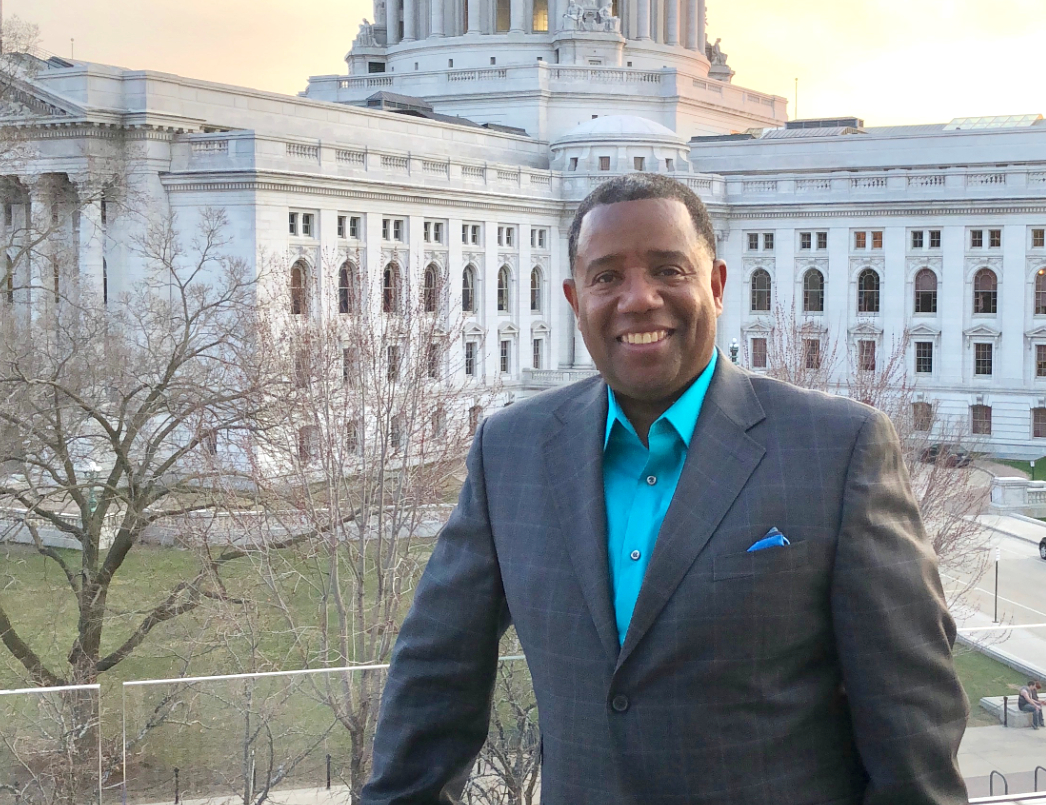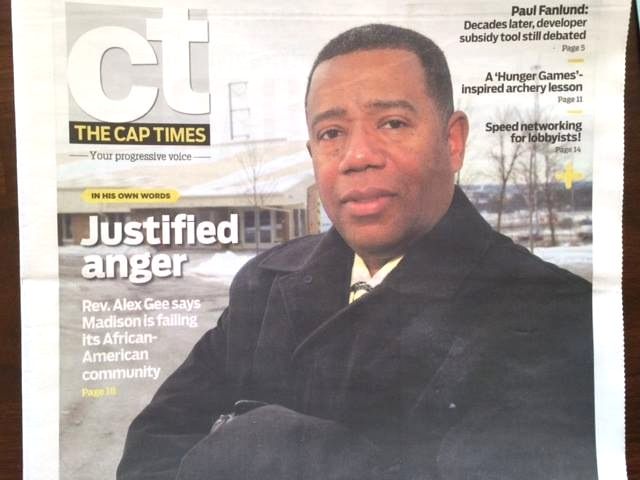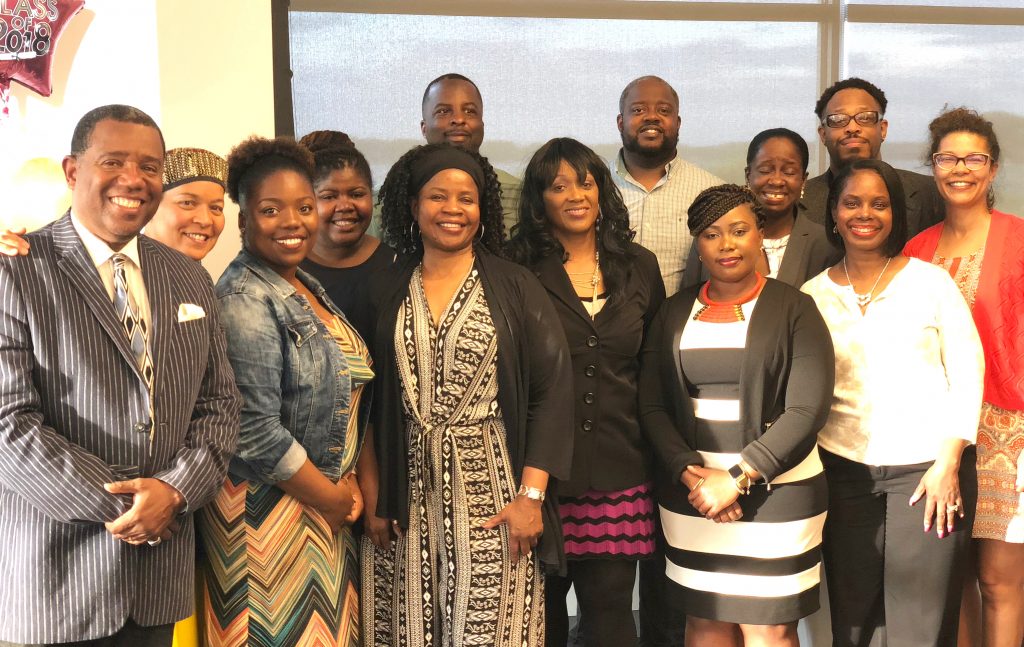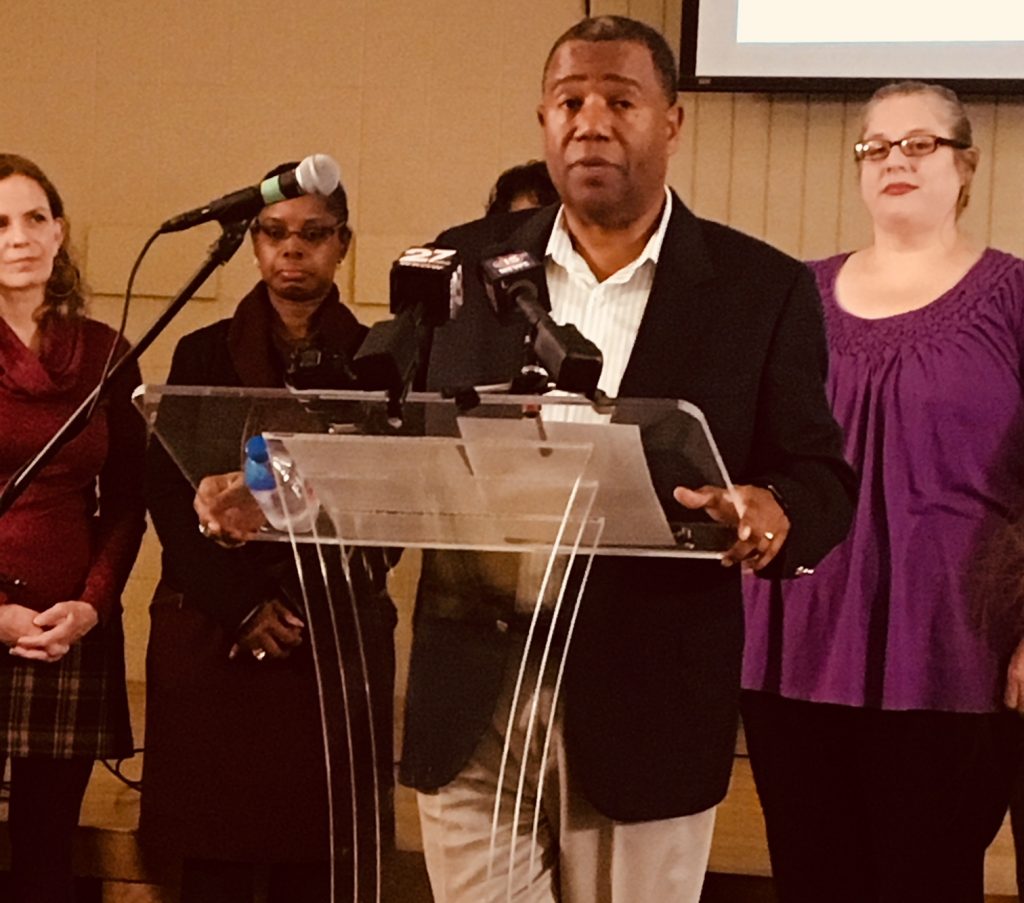
“They used my name and they told me what I was. They wrote it down for everybody to see. Alexander Gee is a [N-word] and they told me that I need to die.”
Rev. Dr. Alex Gee was hosting a large Zoom training session for a large group of Justified Anger volunteers last week when unwanted visitors stormed the meeting.
“It was about 70 folks on a Zoom call and about 99 percent of them were white. This is a chance for me to do some training on how they become partners with us and allies and how they learn to practice anti-racism,” Gee tells Madison365. About one hour into a 90-minute session, the Zoom was hijacked by strange men and loud blaring music came on.
“At first the words we could hear were strongly sexual in tone so it wasn’t racial. I was one of two African-Americans in the chat,” Gee remembers. “Then they started writing ‘KKK’ and they started calling me the N-word and saying that all of us should die.
“It was startling because it was loud. Twenty of our folks just bolted. They left the room,” he continues. “My staff was horrified and they tried to end the call, but I said, ‘Nope. We’re training white allies. We’re not going to end this call.’”
It was a chance for many of the white attendees for the first time in their lives to experience the trauma that many Black people live with on a daily basis. It went on for a few more minutes, although it probably seemed much longer, and then Gee asked the participants, “Alright, what did you hear? What did you feel?”
“When I asked them to process what just happened,” Gee says, “people just started crying.”
Gee is the pastor of Fountain of Life Covenant Church and president of the Nehemiah Center for Urban Leadership Development, where he has worked for three decades to meet the needs of Dane County’s African-American families by addressing their unique spiritual, academic, social, physical and economic concerns. He says it’s not the first time he’s been called the N-word himself.
“Historically, we were called the N-word – particularly to our face – when we became a threat,” Gee says. “When we were chattel property, we worked and got things done, people would call us relatively nice things if you made your master rich. But any time after slavery, if your business or your success became a threat, there was resistance. When Black Excellence has become a threat to White American Exceptionalism, it caused all hell to break loose.
“We’re going to hear more of that word because we are seeing Black people being more of a threat,” he adds. “In their minds, we are supposed to be docile and slow and quiet and not outspoken. The more we shine, the more they are going to call us this word.”
The aftermath of that shocking incident immediately left Gee a little bit angry. Gee went on Facebook Live to talk to the community about it and had what he called some “non-pastoral words” for the racist Zoombombing trolls. But once it was over, it was done. Gee has far more serious things bothering him.
“I can deal with being called a name. I’ve been called that in my life. My mother was called that and my grandmother was called that and they were called worse,” Gee says. “But what I deal with in Madison is people not using that word, but having that attitude. Something has got to precipitate the worst race relations in the country.
“So, somebody called me the N-word, and we’re all going to talk about that for a while,” Gee continues. “But we’re not going to talk about senseless ways in which people are dying and being murdered, the pipeline-to-prison. This is all a product of that system, y’all.
“Are people more upset by the fact that I was called the N-word or that Black-led organizations that lead Black-focused causes are more likely to be underfunded than their White counterparts right here in Madison?” Gee asks. “That’s what scares me. I know how to deal with being called the N-word, but how do you say to a community that being called the N-word is not what’s crippling our community; being treated like the N-word is what’s crippling our community.”
The incident has ignited a passion in Gee that was visible in his Facebook Live and in this interview.
“I can tell you what I find more threatening is to continue to talk with White people who don’t put up measurable resources and time and energy and have measurable goals. That gives me lots of trepidation. I’m done with that. I’ll go back on Zoom and deal with the racists,” he says.

The overt racism that African Americans face on a daily basis has always been both obvious and plentiful. But Gee is much more worried about the covert racism that exists in a White liberal city that he once wrote about in his powerful “Justified Anger” essay in The Capital Times. This powerful and now-famous piece voiced the concerns about ongoing racism and incredible racial disparities here in Madison and how White Madison has been allowed to skate by on so many of its racial issues for so long.
“It’s apparent to me that we’re not any closer to unity and love and hope on this than we were in 2013 when I wrote Justified Anger,” Gee says. “A person with a local business recently asked me, ‘Alex, are we getting better?’ I said, ‘Let me be like Jesus and answer your question with a question: ‘Is your company any more diverse and any more anti-racist than it was when I wrote Justified Anger?’”
The person was quiet.
“That’s your answer,” Gee said.
Gee’s Justified Anger article (and movement) was a response to the Wisconsin Council on Children and Families’ damning “Race to Equity” report that highlighted terrible racial statistics particular to Madison and Dane County: like that the unemployment rate among Dane County African Americans was 25 percent in 2011, compared to five percent among whites in Dane County. Or that the percentage of African-American children living in poverty in Dane County was 75 percent while the percentage of white children living in poverty was just 5 percent.
“Our outcomes are still the same today. Our kids are still failing. White people feel better because they’ve talked about it, I guess,” Gee says. “Has that changed graduation rates? Has it changed COVID-19 attack on Black men and women in jail? Has it changed death rates? Has it changed incarceration rates? Has it changed the fact that we are leading in health issues?
“Until you start asking White people what they are doing to stop this, you don’t have the right to keep asking me … because I don’t run big corporations and I don’t dole out dollars,” Gee continues. “It is insulting to ask me that question: Are we getting better? Ask the people who can make it happen.”

Alex Gee and Annette Miller are on the far left and far right. (L-r) Merta Maaneb de Macedo , Symone Russell, Qiana Abanukam, Melanie Lucas, Aaron Hicks, Toriana Pettaway, Marcus Fleming, Rachel Azanleko-Akouete, Courtney, Corina Moore, and Willie Glenn Sr.,
The Justified Anger Coalition (JAC) was created in February 2014 and launched with the Justified Anger Town Hall Meeting, when leaders in the Black community came together to share with the broader Madison community its plans. JAC is led by African-American leaders whose mission is to “eliminate racial disparities and create opportunities that empower the African-American community to achieve its full potential and prosper.”
“Our big move right now is to take our educational platform and move it online because we don’t know if we can gather in January. We need to take more than 270 people through it,” Gee says. “So we’re in the process of really pushing to raise dollars, to build our infrastructure, to digitize information to create online what we’ve been doing in person. We’re already working on it.”
Justified Anger has a wide variety of programs on leadership development, economic development, youth education, criminal justice and reentry and family and community wellness to improve the health and well-being of the African-American and Madison community as a whole. JA has an African-American History Course, African American Leadership & Capacity Development Institute, a Re-Entry Conference, and more.
Gee says the lack of support from White Madison has been unnerving. Not just for his longstanding organization but for all of the Black-led organizations and non-profits in the city that have emerged since Justified Anger and the “Race to Equity” report highlighted that Madison had the worst racial disparities in the nation.
“If I got to be called the N-word once a week, that’s easier than living in a progressive community like Madison and no one is talking to us – Black-led, Black-focused organizations,” he says. “There are not a lot of organizations that have been doing this for three decades like us.
“I will tell you what: If I had my choice between a very flagrant racist calling me the N-word or people who silently smile to my face and don’t support my community, my organization, my training of White allies,” Gee says, trailing off for a second. “If they smile at me and don’t support the work that I do, I’d rather deal with the Zoombomber. He’s not pretending like he’s my friend.”

Gee says that he knows that we live in a world where people think that word but don’t say it and that he is much more concerned about those attitudes in the city of Madison that are not being articulated.
“My question to my White peers is: What are you going to do to fix it? What are you going to do to fix this for your country, for your company, for your city and for your children? Now is the time to prove that we really want to fix this. Otherwise, don’t be calling me bemoaning the fact that someone called me the N-word.”
“When White people want to show that they are savvy, they are woke and that they are dialed in, they talk. When they show that they really want change, they put money behind it,” Gee adds. “That’s what I’ve learned from my White colleagues. You’ll know when Madison is ready for true change when its beyond talk and they put the dollars behind it. When they put money behind Black-led organizations to do their work. That’s when you’ll know.”
Gee says that he has seen the city of Madison get things done on a variety of issues when it wants to.
“The community said, ‘We need more bike paths in Madison.’ And we acted on it. We found the money. We made it happen because it made life better for some folks. You know, I’m a biker and I’m glad we got them. Biking has health implications,” he says.
“You know what else has tremendous health implications? …. Racism,” he adds. “How do you explain the lack of focus, the lack of dollars, and the lack of strategic goals to get this done? The City has figured out all kinds of problems … we’re not smart enough to fix this? We’re not generous enough to fund the fixing of it?”
Gee makes it clear what he doesn’t want the story to be about. He doesn’t want people to feel sorry for him that racist trolls called him the N-word.
“Yes, I’ve been called that for many years. I want them to understand that there is a silent use of the word and then a very noisy use of the word. If we’re not stopping that kind of behavior, we’re allowing it,” Gee says. “I don’t want people to read this and say, ‘Awwwwwww, Alex.’ I want them to say ‘Awwwwww, Madison.’”
Gee returns one last time to the point that he has been making for more than three decades: What are we going to do about Madison’s nation-leading racial disparities.
“If the worst racial disparities in the nation are not due to racism, that means we’re genetically inferior,” Gee says. “Is that what people think?
“Madison leads the nation in all of these racial disparities. If we are going to blame being called the N-word and all of the KKK stuff on right-wingers and Trump supporters, then who do we blame the silence of white progressives on the worst racial disparities in the nation? What is that due to? Why are they quiet?
“I need those questions asked.”



